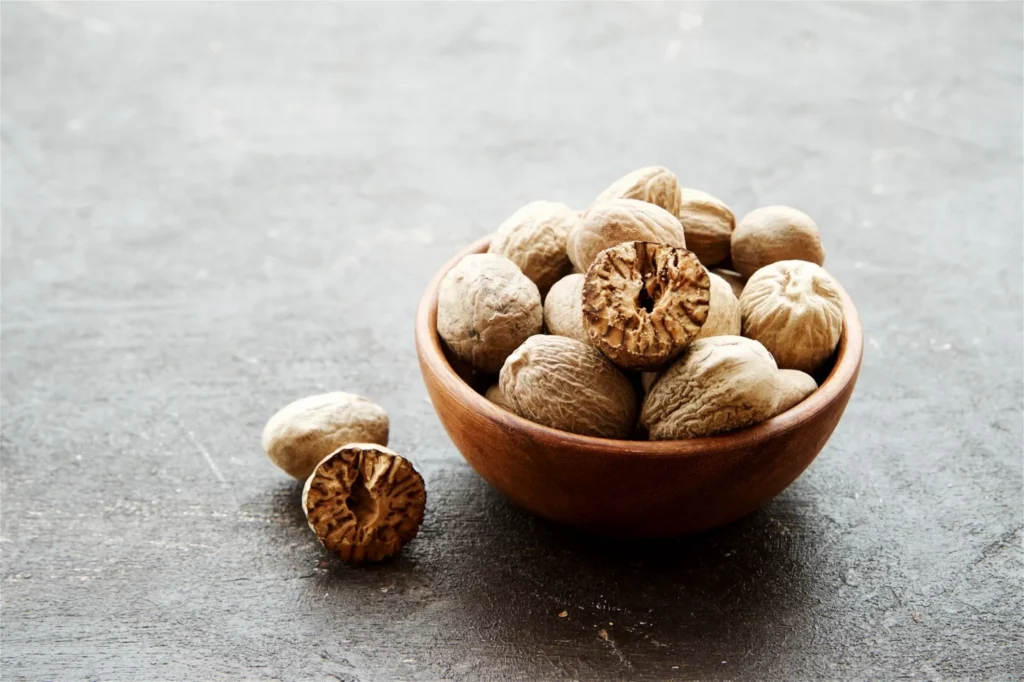
In the hustle and bustle of modern life, sleep often becomes a luxury rather than a necessity. Stress, screen time, and erratic schedules leave many of us tossing and turning at night, searching for natural solutions that won’t come with side effects or dependency issues. Among the many herbal and natural remedies gaining popularity today, one humble spice has emerged as a surprising aid nutmeg for sleep.
Known for its warm, nutty flavor and use in holiday desserts, nutmeg has a long history that extends beyond the kitchen. For centuries, cultures around the world have used it as a natural remedy for digestive issues, pain relief, and notably, as a sleep aid. But is there any truth to these traditional claims? Let’s dive into the science, tradition, and ways you can safely use nutmeg for sleep.
The Origins: Traditional Uses of Nutmeg for Sleep

Nutmeg, derived from the seed of the Myristica fragrans tree native to the Banda Islands of Indonesia, has been used for centuries in traditional medicine systems, including Ayurveda and Unani.
In Ayurveda, nutmeg (known as jaiphal) is often used in powdered form, sometimes mixed with warm milk or honey, to calm the mind and body. Practitioners believe it balances the vata dosha, the energy associated with movement and activity, which tends to spike during times of stress or anxiety—two major culprits behind sleepless nights.
In Unani medicine, nutmeg is praised for its sedative, digestive, and aphrodisiac properties. It's also mentioned in ancient Persian texts as a remedy for insomnia and mental restlessness.
The Science Behind Nutmeg’s Sedative Effects

While traditional medicine has embraced nutmeg for generations, modern research is beginning to uncover why it might be effective for promoting sleep.
1. Contains Myristicin and Elemicin
Nutmeg contains myristicin, a natural compound believed to have mild sedative and calming effects. Myristicin interacts with the central nervous system and may influence serotonin production, which plays a key role in sleep regulation and mood stabilization. Another compound, elemicin, is also thought to contribute to nutmeg’s calming effects.
2. Mild Muscle Relaxant
Some studies suggest that nutmeg can act as a muscle relaxant, helping the body prepare for sleep by reducing physical tension. This effect, coupled with its impact on the nervous system, could contribute to a more restful night's sleep.
3. Anti-inflammatory and Antioxidant Properties
Chronic inflammation and oxidative stress are linked to poor sleep quality. Nutmeg’s anti-inflammatory and antioxidant properties may help soothe the body, reduce stress, and create a more favorable internal environment for sleep.
How to Use Nutmeg for Sleep

Using nutmeg as a sleep aid is simple, but it's important to get the dosage right. Nutmeg is potent, and too much can cause side effects.
1. Nutmeg Milk (Golden Milk Variation)
One of the most popular and effective ways to consume nutmeg is by adding a pinch (1/8 to 1/4 teaspoon) of ground nutmeg to a glass of warm milk. You can also mix it with turmeric, honey, or a dash of cinnamon for added flavor and benefits. Drink it about 30 minutes before bedtime.
2. Nutmeg and Honey Paste
Mix a small pinch of nutmeg with a teaspoon of raw honey and consume directly. Honey acts as a natural sleep promoter and complements nutmeg’s sedative qualities.
3. Nutmeg Tea
Steep 1/4 teaspoon of nutmeg in hot water for 5-10 minutes. You can combine it with other calming herbs like chamomile or lavender for a more potent sleep-inducing effect.
⚠️ Important Note: Never consume more than 1/2 teaspoon of nutmeg in a single day. High doses can be toxic and cause hallucinations, nausea, palpitations, and dizziness.
Potential Side Effects and Precautions
While nutmeg can be helpful in small amounts, it’s crucial to approach its use with caution.
1. Overconsumption Can Be Dangerous
Nutmeg contains psychoactive compounds like myristicin and safrole. In large amounts, these can be toxic and even lead to “nutmeg poisoning,” characterized by nausea, hallucinations, and palpitations. Always stick to a safe dosage (1/8 to 1/4 teaspoon).
2. Not Recommended for Children or Pregnant Women
Because of its potency, nutmeg is not recommended for young children or pregnant women unless advised by a healthcare professional.
3. May Interact with Medications
If you are on medication, particularly sedatives, antidepressants, or sleep aids, consult your doctor before using nutmeg as it may amplify their effects or cause interactions.
Who Can Benefit from Nutmeg for Sleep?
Nutmeg may be particularly beneficial for:
- People with mild insomnia or trouble falling asleep
- Those experiencing anxiety or stress-related sleeplessness
- Individuals looking for natural alternatives to pharmaceutical sleep aids
- Elderly individuals who prefer herbal solutions to manage occasional sleep disturbances
That said, nutmeg should be used as a complement to other good sleep hygiene practices like maintaining a consistent bedtime, reducing screen time before bed, and creating a calm sleep environment.
Conclusion: A Time-Tested Sleep Ally
Nutmeg, with its rich history and promising natural compounds, can be a gentle, effective sleep aid when used correctly. While it's not a cure-all, it serves as a valuable part of a holistic approach to better sleep. Whether you stir it into warm milk or combine it with other calming ingredients, this spice can offer a fragrant, comforting way to wind down and drift off naturally.
As with any remedy, individual results may vary. Start with a small amount, pay attention to how your body responds, and consider consulting a healthcare provider if you have underlying conditions or take medications.
Nature has long provided what we need for balance—and nutmeg may just be the aromatic, age-old key to a good night’s sleep.



